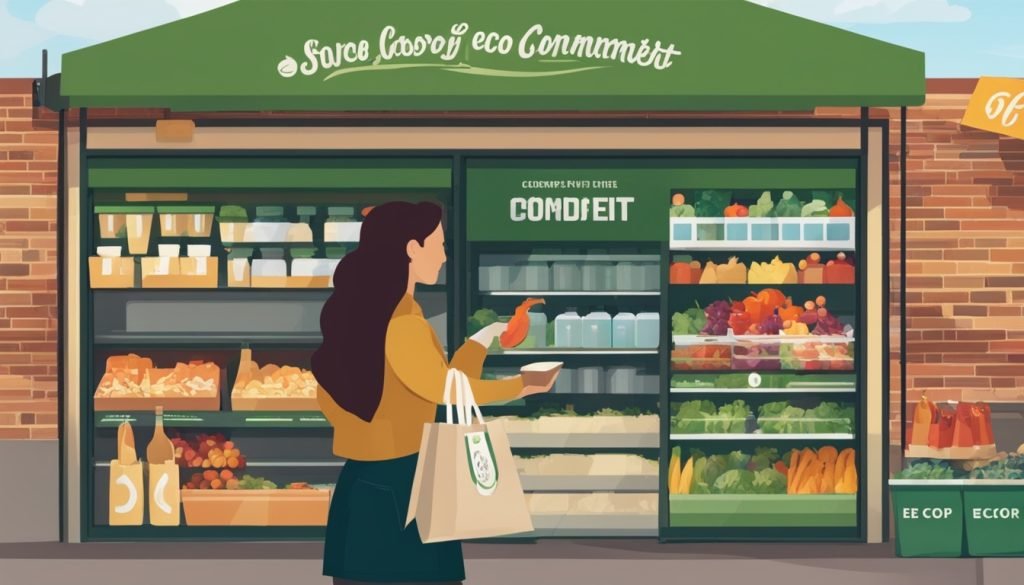What we buy impacts the world. Ethical consumerism means thinking about how our choices affect people, the economy, and the planet. It’s about making choices that help make the world a better place.
There are many ways to be an ethical consumer. Buying things that are made nearby and from good materials is one. Buying second-hand helps the planet. So does choosing products made in a fair way. Buying organic is another good choice. It helps the environment.
Eating well, using less packaging, and learning about what we buy are also part of living ethically. Each of these choices helps others and the planet in its own way.
More and more people are choosing ethical consumerism. They look for products and services that match their values. This way of shopping helps not just the planet and people but gives us all power to change things for the better.
Key Takeaways:
- Ethical consumerism involves making responsible and sustainable purchasing decisions.
- Purchasing locally made products and choosing ethically sourced and sustainable materials are essential aspects of ethical consumerism.
- Buying used products, supporting fair trade, and opting for organic products are ways to incorporate ethical consumption into daily life.
- Considering a product’s life cycle, reducing energy consumption, planning meals, staying informed, and sharing knowledge with others are also important ethical lifestyle decisions.
- By embracing ethical consumerism, individuals can contribute to a more sustainable and equitable world.
Ten Strategies for Ethical Consumption
Choosing what we buy can positively impact the world. Using eco-friendly and ethical practices helps our planet and people. Let’s explore ten ways you can shop ethically.
1. Purchase Locally Made Products
Buy items made close to home to support your community and cut down on pollution. This choice helps grow local businesses and lowers the emissions from shipping.
2. Choose Sustainable and Ethically Sourced Materials
Pick items made from organic cotton, bamboo, or recycled materials for a eco-friendly buy. Check for Fairtrade or Rainforest Alliance labels to ensure they were sourced ethically.
3. Buy Used Products
Shop for second-hand items to reduce waste. This practice supports a circular economy and gives products a longer life.
4. Opt for Minimal or Sustainable Packaging
Look for products with eco-friendly packaging. Choosing materials like recycled paper or biodegradable plastics helps cut down on trash.
5. Look for Fair Trade Products
Buy goods with fair trade labels to support fair wages and safe working conditions. This choice supports ethical labor practices around the world.
6. Select Organically Produced Products
Support natural farming and protect the earth by choosing organic. Organic farming doesn’t use harmful chemicals and helps preserve the environment.
7. Consider a Product’s Entire Life Cycle
Think about a product’s impact from beginning to end. Choose from companies that value eco-friendly and sustainable production and waste management.
8. Reduce Energy Consumption
Pick energy-saving appliances and use renewable energy when you can. Lowering energy use helps combat climate change and keeps the planet healthy.
9. Plan Meals and Reduce Food Waste
Eating ethically means cutting down your food waste and supporting sustainable farming. Choose local and organic food to lessen your food’s environmental effects.
10. Stay Informed and Share Knowledge
Learn about ethical shopping and spread the word. Being informed helps you make better choices and helps others do the same, creating a ripple of good change.
Being an ethical shopper is a journey of learning and improving. By following these tips, you can have a real impact on a greener, fairer world.
Challenges of Ethical Consumption and Solutions
Ethical buying can be tough. People often find it hard to know where products come from. They might also cost more than regular items, be hard to find in some places, and the info is confusing at times. It’s not easy to change how we shop.
But, there are ways to make ethical choices easier:
- Researching brands and looking for certifications: Learning about brands and their values helps us pick those that match ours.
- Prioritizing purchases and seeking discounts or secondhand options: Prioritizing needs and finding cheaper, greener options can help.
- Utilizing online shopping platforms and seeking local alternatives: Shopping online offers ethical choices. Purchasing local supports our community and the environment.
- Relying on third-party certifications for reliable information: Third-party checks give trustworthy details on a brand’s ethics.
- Starting small and gradually increasing ethical consumption: Small steps in ethical shopping are effective. They lead to bigger changes over time.
- Educating oneself and others about the benefits of ethical consumption: Sharing the good of ethical buying can motivate more people to do it.
Following these steps makes ethical shopping easier. It helps us move towards a better world.
Image:

Unveiling the Ethical Practices of Brands
Looking into brands helps us become ethical shoppers. We check out what a brand stands for and its certifications. This lets us choose stuff that matches our values.
Going to a brand’s site and social media gives us clues on how they act. We can see their projects, who they work with, and how open they are. Reports and policies dive deeper into a brand’s impact on the world, helping us see if they meet our ethics.
There are tools online to compare brands’ ethics. They show us a lot of info, making it easier to decide wisely. With these tools, we spot brands that do good, like they use eco-friendly methods or treat workers fairly.
Talking with brands and other shoppers can teach us a lot, too. Chats with the companies or joining discussions online offer insider looks. It helps us understand how committed these brands really are to being ethical.
Brands at the forefront of ethical shopping have earned marks from trusted groups like Fairtrade and the Rainforest Alliance. Getting these marks shows they care about paying fairly, using resources wisely, and protecting the environment.
Brands with Ethical Certifications
| Brand | Certifications |
|---|---|
| Patagonia | Fair Trade Certified, Bluesign |
| Ben & Jerry’s | Fairtrade, B Corporation |
| Unilever | UTZ, Rainforest Alliance, Fairtrade |
| TOMS | B Corporation |
| Numi Organic Tea | Fair Trade Certified, USDA Organic |
Exploring brands is key to being a more ethical shopper. We find out what they do and how they do it. This helps us buy things that reflect our values and support a better world.
Incorporating Ethical Practices into Daily Life
Ethical consumerism is more than just buying wisely. It’s adding ethical actions to our daily routines. People do this to support their values and help the planet and society. Making careful choices in what we buy can help a lot.
Here are some easy ways to be more ethical every day:
- Be mindful before making purchases: Think about the effects your buying has on people and Earth. Always look for ethical choices or if it fits your beliefs.
- Choose certified products: Seek out items with Fairtrade, Rainforest Alliance, or Organic labels. These mean the product was made with people and nature in mind.
- Shop locally: Buy from your town’s shops to cut down on your pollution. This also supports your local economy and its farmers.
- Learn to fix or buy second-hand: Try fixing things or buying used. This lowers how much waste we make and gives products a longer life.
- Eat sustainably: Think about what you eat’s effect on the planet. Choose organic and local foods when you can. Eating less meat helps, too.
- Ask tough questions: Push businesses to be clear about their ethics. You can help make them more honest and responsible by doing this.
- Seek transparency: Pick brands that tell you about their supply chain. This shows they care about where their goods come from and who makes them.
By doing these small things, you become a mindful shopper. This helps make the world better for all. Remember, even little steps matter. Together, they add up to big change.
Quotes:
“Ethical consumerism is about more than just what we buy. It’s a way of thinking and living. It’s being aware of how what we choose affects others and aiming to do good.” – Emma Thompson
Comparing Ethical Lifestyle Choices
| Practice | Description | Benefits |
|---|---|---|
| Shopping locally | Purchasing products from local businesses and farmers | Supporting local economies, reducing carbon footprint |
| Choosing certified products | Selecting products with recognized ethical certifications | Ensuring ethical and sustainable production |
| Learning to fix or buy second-hand | Repairing items instead of buying new and purchasing used products | Reducing waste, promoting a circular economy |
| Eating sustainably | Opting for organic, locally sourced, and plant-based food | Reducing the environmental impact of food production |
| Asking tough questions | Demanding transparency from companies about their ethical practices | Encouraging accountability and responsible behavior |
| Seeking transparency | Supporting brands that disclose information about their supply chains | Ensuring ethical sourcing and labor practices |
Remember, ethical consumerism is a journey. Every step you take brings us closer to a better world. Start with small changes in your daily life. Invite others to join you on this important path.

The Power of Ethical Consumption
Ethical consumption can lead businesses to be more eco-friendly. When people buy wisely, they influence companies to improve how they get their products. This can make businesses think about their actions more carefully.
Choosing ethical products helps the planet. It gives us a chance to support things that help fight climate change. Every time you buy something, you’re voting for a better and greener world.
Even small changes in what you buy can help a lot. Supporting brands that care about the environment matters. It all adds up to a world that’s kinder to people and the Earth.
Buying from places that care about the planet makes them more common.
When companies get asked for eco-friendly options more often, they listen. Buying with ethics in mind can make businesses check how they operate. It calls for them to be open, clean up their act, and do less harm to the planet.
Impactful Ethical Consumerism Habits:
- Supporting eco-friendly brands and sustainable practices
- Choosing products with minimal packaging and reducing waste
- Opting for fair trade and ethically sourced goods
- Considering the entire life cycle of a product, from production to disposal
- Reducing energy consumption through conscious choices
- Supporting businesses that prioritize social responsibility
Every ethical choice you make is part of a big move towards fairness. Choosing wisely helps the Earth and makes the future better for everyone. It shows how great our power together can be.
The Journey to Ethical Consumerism
Choosing ethical consumerism means thinking about what you buy and why. It’s about making a difference through what we choose to support. To start, we need to know our own values. Then, we should look into the brands and products we buy to see if they match what we believe.
We can make the world better by making smart choices. We need to keep improving how we buy things. Ethical shopping isn’t about being perfect. It’s about trying to do good whenever we can.
We can feel good by buying from companies we believe in. When we pick items that care about people and the earth, we help those companies grow. This encourages more companies to do the right thing too.
Joining the ethical consumerism movement makes us powerful. Every item we choose to buy is a vote for the kind of world we want. We support those who are trying to make a positive difference.
End the Story
Conclusion
Ethical consumerism means thinking about what you buy. This includes how it impacts people, the economy, and the planet. Making smart choices, like buying local, picking eco-friendly items, and using less, helps a lot. We can work towards a better world by these actions.
Yes, picking things the right way isn’t always easy. But, there are answers. Learning about which brands are better, choosing carefully what you buy, and starting with small changes all help. Every choice we make is a chance to live our values and help the world.
Deciding to be an ethical consumer is a big deal. It’s a way for us to change the future for the better. When we choose what’s right, we’re supporting good ways of doing things. And this choice starts a chain reaction. Together, we can make sure our buying habits help the earth and everyone on it. It’s a step towards a world where doing the right thing every day is common. And where our choices lead to a future that’s fairer and better for everyone.









